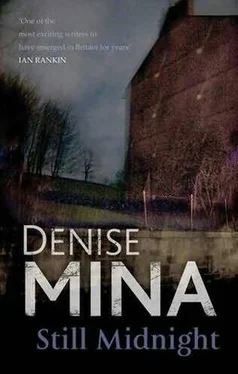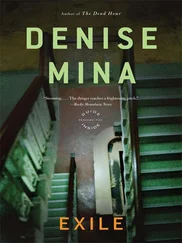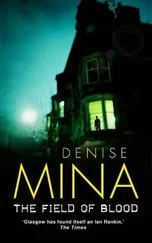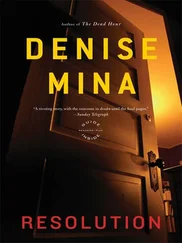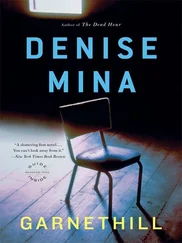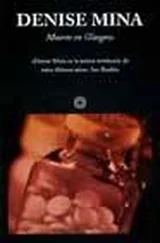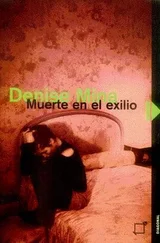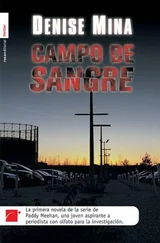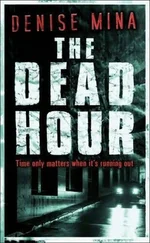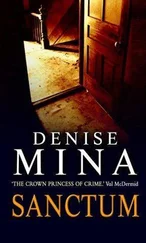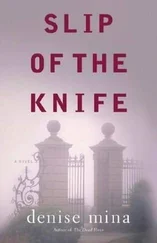The shot of the room was badly set up. It wasn’t there to capture the nuances of the suspect’s facial expressions but to prove that no one had been throwing punches. Because the camera was mounted high up on the wall the room looked narrower on camera than it seemed when she was in there, more claustrophobic. And the image was grainy, the colour drained from the room into a palate of grey and blue and yellow. A table with a wooden top, four chairs, a light switch and the door which had been left open slightly, the dusty top of it visible.
The door opened suddenly and Omar Anwar walked in. A muted cheer rose from the officers in the viewing room, muted because she was there, but it was as close to camaraderie as she had felt since her promotion and she found herself not exactly joining in but smiling along.
They liked that.
Omar sloped into the room as if he had extra vertebrae, hips first, bending like a question mark as he put his plastic tumbler of water on the table. Bannerman came into the room after him and some of his fans gave another cheer. Morrow didn’t concur with that one and felt them clock it.
A fat officer nicknamed ‘Gobby’ came in after them. Gobby rarely spoke. Bannerman had chosen him over her, she realised, so he could shine.
Someone at the back muttered to themselves, ‘The BannerMan’ll nail him.’ The nickname brought a sting of bile to the back of her throat.
At Bannerman’s invitation Omar sat down facing the camera, sitting well back from the table to make room for the splay of his legs. They couldn’t quite see his face but his body was expressive enough. He was jittery, reached for his water, withdrew his hands, wriggled in the seat as Bannerman took off his suit jacket and hung it carefully on the back of his chair.
He took his time, sitting down, rolling his shirt sleeves up, assessing the tall, anxious boy without addressing him. Gobby handed him one of the tapes and they turned away in their seats to the tape recorder, noisily pulling the cellophane off two cassette tapes which they slipped into the tape recorder behind them. Omar watched, frightened, as the policemen looked at each other, nodded and shut the cassette cases, pressing record. A high-pitched yowl filled the room as they turned back to the table. Reverently they waited until it had finished.
Omar looked quizzically at Gobby.
‘Blank bit o’ tape,’ said Gobby quietly.
Pathetically grateful for the explanation, Omar smiled and leaned towards him, clutching at the implied kindness, pleading with Gobby to be his ally.
Gobby looked away.
Bannerman opened the play with a lingering explanation of what had brought them all here today, the rules, telling Omar that he was being watched by third parties, slowing his speech to a languorous drawl as if to counter Omar’s frantic interjections of yes, thank you, thank you, he understood, his face twitching into micro-frowns and frights, his leg vibrating up and down under the table.
Bannerman looked straight at the boy suddenly. ‘Omar,’ he flashed a smile that even looked cold from behind, ‘what do you do for a living?’
Omar looked at both of them. ‘Living?’
‘A job. What do you do for a job?’
‘I’ve just graduated.’
‘From uni?’
‘Glasgow Uni, yeah, law school.’
‘Law school?’ He was building to something but Omar interjected.
‘Got a first.’
‘Good, good. Have you got a job to go to?’
‘No, still looking around, ye know…’
‘Had interviews and so on?’
‘Well, no, not really, not sure if Law’s for me really.’
At the back of the viewing room someone made a joke about one less of ’em. No one laughed. Jokes about lawyers were fine but the guy was Asian and the racist connotations were uncomfortable.
‘I want you to talk us through what happened tonight.’
‘OK, OK.’ Omar took a sip of water.
‘Whenever you’re ready,’ said Bannerman, meaning hurry up.
‘OK, well me and Mo-’
Bannerman read from his notes, ‘Mohammed Al Salawe?’
‘Yeah, Mo. Me and Mo were sitting in the car-’
‘The Vauxhall?’
‘I was outside with Mo, in the Vauxhall, round the corner, smoking actually, and had the radio on, just chatting and, and we heard a loud sort of ‘pop‘ like a ‘pwomf’ sort of noise, never heard anything like that, and there’s this light, sort of white light in Meeshra’s window…’ The story got faster and faster, the words splattering into the room. ‘And we never even said anything to each other just, like, ran-’
‘What did you think it was?’
Omar looked confused.
‘The noise,’ explained Bannerman. ‘What did you think made it?’
‘Honestly?’ Omar tipped his head sincerely.
Bannerman nodded.
‘I thought it was a gas canister on a stove cooker. It’s stupid because we don’t use a stove cooker but in Pakistan you often hear of honour killings where a mother kills a daughter-in-law if she’s had an affair or something and the way they do it is tamper with the gas canister on the stove. Stupid,’ he shrugged, ‘but that’s what came to my mind…’
‘Are your family from Pakistan?’
‘No.’
‘Why would you think that then?’
‘Dunno.’
Bannerman tipped his head to the side, as if Omar had said something significant, wrong-footing him. ‘And so you ran to the house, which way did you go?’
Omar shook his head and blinked, bringing himself back to the memory. ‘Um, I was on the passenger side, the road side. I opened the door, stepped out into the street,’ he flicked his hand to the side, as if he was throwing a cigarette butt away, ‘ran around the bonnet of the car-’
‘Mohammed’s car?’
‘Yeah, yeah, Mo’s car…’ He had lost his thread.
‘To the house?’
‘Yeah, jumped onto the wee garden wall there, ran over, slipped at the corner a bit, caught myself, didn’t fall, ran to the door-’
‘Was the front door open or shut?’
‘Um, shut.’
Morrow felt sure he was telling the truth, from his short sentences, the distant look in his eyes, the way he glanced downwards to see the road, the garden wall and the reflexive flattening of his hand in front as he stopped himself from falling.
‘The door was shut-’
‘And you opened it?’
Bannerman should stop interrupting, Morrow observed, he was breaking up the memory. It was easier to spot the lie in a long flow, the break in style was more obvious. It was the intrusion of the camera, Bannerman was determined to be seen. She envied his confidence but she could see that it was a handicap sometimes.
‘Yeah, I opened it.’ Omar looked at Bannerman for a prompt.
‘And?’
‘ And. ’ He stopped, glanced into the camera and froze a moment as he realised that the eye was judging him. His forehead wrinkled suddenly, a child giving an excuse, and he looked away. ‘And what?’
‘What did you see when you opened the door?’
Omar looked at the camera again but his brow had straightened defensively. ‘Saw my folks standing in the hall, on the right.’ He put his hand out to indicate their position. ‘Saw my brother Billal there too, near the door, standing in front of his room. The door was open behind him. Saw my wee sister, Aleesha,’ his throat caught when he said her name, ‘standing to the left, with her hand up.’ He raised his left hand, twisting the wrist like the Statue of Liberty. ‘Everyone was looking at her hand…’ His chin buckled at the memory and he lost his breath.
‘What about the men?’ said Bannerman briskly. He was busy looking at his notes, he was missing all of it.
‘The men.’ Omar shook himself. ‘The men were standing in the hall, yes. One with my folks, between me and my folks, the other in front of Aleesha, looking at her. His gun was down there.’ Omar slung his hand down, at ninety degrees to his thigh.
Читать дальше
